January 10, 2017
Edited by David Sanders
Specimen Days
1811—Marie-Joseph Chénier, French poet (b. 1764), dies.
1855—Mary Russell Mitford, Engl playwright/poet (Julian), dies at 67.
1883—Aleksei Tolstoi, Russian poet/writer (Pjotr Peroyj) [NS], is born.
1887—Robinson Jeffers, US, poet/playwright (Tamar & Other Poems, Medea), is born.
1928—Philip Levine, American poet, born in Detroit, Michigan.
1939—Jared Carter, American poet, is born.
1957—Gabriela Mistral, Chilean poet (Nobel Prize 1945), dies at 67.
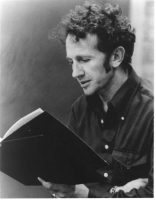
Someone was calling someone;
now they've stopped. Beyond the glass
the rose vines quiver as in
a light wind, but there is none:
I hear nothing. The moments pass,
or seem to pass, and the sun,
risen above the old birch,
steadies for the downward arch.
—from “In A Vacant House” by Philip Levine
“Someone was calling someone; / now they’ve stopped. Beyond the glass / the rose vines quiver as in / a light wind” – Philip Levine
World Poetry
A Poem Praises Smog, and Why Not? It’s From Cancer’s Perspective
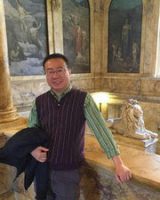
For millions of Chinese, the new year opened under an oppressive shroud of smog that has closed highways, delayed or canceled hundreds of flights and shut down schools, forcing some students to follow their lessons from home through online streaming. The toxic air has also drawn attention to a poem written by a Chinese surgeon from the viewpoint of an ambitious lung cancer that revels in the “delicious mist and haze.” The poem was first published in English in the October issue of Chest, the journal of the American College of Chest Physicians, under the title “I Long to Be King.
A Chinese surgeon has written a poem from the viewpoint of an ambitious lung cancer that revels in the “delicious mist and haze” of pollution.
Recent Reviews
New Poetry from Jane Mead and Daniel Borzutzky Examine Death — In Both Human and National Forms
by Carol Muske-Dukes

Here are two books that differ dramatically stylistically, yet are unforgettably linked by images of the dying human body. In Jane Mead’s book-length poem, “World of Made and Unmade” the failing body is that of a “beautiful and practical” mother. In Daniel Borzutzky’s “The Performance of Becoming Human,” the central obsession turns on how “authoritarian” nation-bodies absorb and destroy “powerless” bodies.
Archeophonics
by Martha Ronk
The poems in Peter Gizzi’s most recent book, Archeophonics, operate as an homage to sounds as in the title poem that celebrates echoes, repetitions, and other poems, “the archive in the mouth”:
I’m saying this and it’s saying me
That’s how it works, seesaw like
The archive in the mouth and the archive is on fire
That’s the story
The sun and the body and the body in the sun
A trajectory runs through the whole from poems of despair and loss to those of revival as “the old language / continues its dialogues / in ordinary dust.” The book directly raises questions of how one is to go about the writing of poetry given the collapse of language and the self, as in an initiating quotation from Rimbaud: “For today’s tourist, orientation is impossible.” The first section presents a speaker who is burdened by time’s passing, the collapse of syntax, and an overarching doubt: “To know something / and fail. / Why discount it? / The onslaught of eyes / beneath a fuck-you sky.”
Poetry by Sharon Olds, Donika Kelly, Catherine Pierce
by Diana Whitney
Poetry works its power in the face of intolerance and hate; we need its emotional truths more than ever after the 2016 election. “A poem takes back language, re-energizes it, reinvigorates it in a way that a post doesn’t,” says inaugural poet Richard Blanco, speaking of the consolation of art in our chaotic world. Sharon Olds is a poet for these times, a powerful woman who won’t back down. For more than three decades, her poems have been fearless, intimate and ardently pro-sex.
Delmore Schwartz vs. Delmore Schwartz
by Ange Mlinko
Delmore Schwartz (1913–1966) lay dying of a heart attack in the hallway of a sleazy midtown Manhattan hotel for at least an hour before an ambulance was called around 4:00 a.m.; his body then lay in the morgue unclaimed for two days. The judgment of his contemporaries and students on this early casualty of the confessional generation could serve as a snapshot of blighted promise. “The American Auden,” boasted James Laughlin. Or, no, “the new Hart Crane,” proposed Dwight MacDonald. “He was tortured, beyond what a man might be,” avowed John Berryman. “The two sides of his face were different one from the other and reflected, he thought, a split in his personality,” reported Eileen Simpson. “One vowel bedevilled by seven consonants,” quoth Lowell. “You were the greatest man I ever met,” Lou Reed effused.
Two books that differ dramatically, yet are linked by images of the dying human body: Jane Mead’s “World of Made and Unmade” and Daniel Borzutzky’s “The Performance of Becoming Human.”
Broadsides
Poet Philip Levine Sketched the Life of Working-class Americans
by Thomas Curwen
In the spring of 1952, poet Philip Levine worked at the Chevrolet Gear and Axle plant in Detroit, Mich. He was 24 and had been writing poems for nearly 10 years. Some get their calling early, but being a young poet is not easy. He had clocked hours in an ice factory, a bottling corporation, on the railroad — but none as boring and hazardous as in the gear and axle plant, where he pulled automotive parts from the forge and hung them on conveyors that whisked them elsewhere in the factory.
The Erasure of Islam from the Poetry of Rumi
by Rozina Ali
A couple of years ago, when Coldplay’s Chris Martin was going through a divorce from the actress Gwyneth Paltrow and feeling down, a friend gave him a book to lift his spirits. It was a collection of poetry by Jalaluddin Rumi, the thirteenth-century Persian poet, translated by Coleman Barks. “It kind of changed my life,” Martin said later, in an interview. A track from Coldplay’s most recent album features Barks reciting one of the poems: “This being human is a guest house / Every morning a new arrival / A joy, a depression, a meanness, / some momentary awareness comes / as an unexpected visitor.”
When Coldplay’s Chris Martin was going through a divorce from the actress Gwyneth Paltrow and feeling down, a friend gave him a book of poetry by Rumi.
Drafts & Fragments
All the Kitsch
by Dan Piepenbring
John Ashbery is eighty-nine. In the last two months, he’s published a new collection of poems, Commotion of the Birds, and launched an exhibition of his latest collage work, which appears through January 28 at Tibor de Nagy.
What have you done in the last two months?
Poet: I can’t answer questions on Texas standardized tests about my own poems
by Valerie Strauss
Badly worded or poorly conceived questions on standardized tests are not uncommon (remember the question about a “talking pineapple” on a New York test in 2012?). But here’s something new: The author of source material on two Texas standardized tests says she can’t actually answer the questions about her own work because they are so poorly conceived. She also says she can’t understand why at least one of her poems — which she calls her “most neurotic” — was included on a standardized test for students.
At age eighty-nine John Ashbery has published a new collection of poems and launched an exhibition of his collage work at Tibor de Nagy.
Poetry In the News
Retired UGA Professor Judith Ortiz Cofer Dies; Remembered for Literary Talent and Teaching

Judith Ortiz Cofer, a long-time University of Georgia professor of English and an accomplished poet and author, died Dec. 30 at her home in Jefferson County. She was 64. Cofer, who in 2010 was inducted into the Georgia Writer’s Hall of Fame, was a professor from 1984 until she retired in 2013. She became ill from cancer not long after retirement, but continued to make speaking engagements, including a literary festival last April at Western Carolina University.
TS Eliot Prize 2017: Read Extracts from the Poets Shortlisted for the World's Biggest Poetry Prize
Beautiful and sad: This year's TS Eliot Prize shortlist explores a multitude of topics
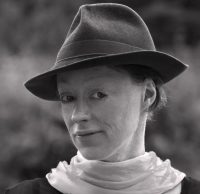
“Genuine poetry can communicate before it is understood.” So said TS Eliot, a pioneer of a poet who had the power to dazzle and disturb, and the namesake of the world’s foremost poetry prize. This year’s TS Eliot Prize shortlist does that – it communicates the feeling of finding beauty in small corners, of the pain and absurdity of human deficits, of love, loss, music and nature. The poems are funny, sad, beautiful and commanding; to read them is to feel like breathing clean air. This year’s winner will join prestigious company; previous winners of the prize include Ted Hughes, Seamus Heaney, Carol Ann Duffy, Anne Carson and Sharon Olds. It was awarded last year to Sarah Howe for her debut collection, Loop of Jade, an exploration of her own dual Anglo-Chinese heritage.
Judith Ortiz Cofer, a long-time University of Georgia professor of English and an accomplished poet and author, died Dec. 30 at her home in Jefferson County.
New Books
Unlikely Conditions by Cynthia Arrieu-King and Hillary Gravendyk
[Paperback] 1913 Press, 55 pp., $15.00
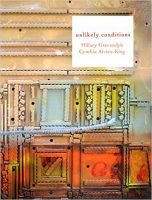
A collaborative text by two beloved poets, Cynthia Arrieu–King and the late Hillary Gravendyk, UNLIKELY CONDITIONS, "was written as a way to embellish and perpetuate a friendship." Of her process working with Gravendyk, Arrieu–King says: "We created this book through conversation about what remains important as we get older, jokes, inferences about existence, shared experience, separate experiences melded together, and a hilarious engagement with detail. We had a lot of fun together. This was the experience with all of Hillary's collaborators including her sister Megan Estrella, Maureen Alsop, Colleen Rosenfeld, Brenda Hillman, etc. I'm putting it out in the world because my friend and I had always talked about that as a given and also because I feel Hillary's family and other readers would want to see the beautiful work she did with me, and see a bit more of her intelligent heart and her love for life."
Prosopopoeia by Farid Tali
[Paperback] Action Books, 86 pp.,$16.00
"In lines so lush they verge on grotesque, the body and its beauty are rendered by Farid Tali. As 'render' means to depict but also separate flesh from its bone, so too does this elegiac novel dismantle the barriers of memory, romanticism, and predetermination to illuminate the ragged beauty of a body in transition out of itself and into what is void. Is death beautiful? If beauty rages, shocks, evanesces, then it must be. Aditi Machado makes a stark, dark French into tight, lean English, taut as a string that when plucked must sing. A brief novel that only seems to drift lightly like a musical air; in reality it will settle down heavy in your bones and haunt you a long, long time." —Kazim Ali
Duties of the Heart: a Verse Memoir by Bea Opengart
[Paperback] Dos Madres Press, 70 pp., $16.00

"'How will I know myself?' asks Bea Opengart in this searching, insistent archaeology of familial remembrance, separation, distance, and connection. Her quiet new volume investigates remnants — some haunted, all infused with story; all inviting reverent and painstaking interrogation. These are grief poems, but they are both dry–eyed and clear–eyed. Their objectivity is infused with a tenderness that not only knows its place, but occupies it dead–center, with uncomplicated certainty."—Frannie Lindsay
The Rings of the Universe: Selected Poems by Ubaldo de Robertis
[Paperback] Chelsea Editions, 193 pp., $20.00
Verse by a nuclear scientist, novelist and poet that challenges the reader with new ways of seeing space, time and transience. In the introduction, translator Adria Bernardi writes that the poetry of de Robertis emerges from his study of physics and cosmology, his understanding of spacetime and quantic events, and thus transmits a spirit of continual exploration.
In the Clearing by Madeline Tiger
[Paperback] Dos Madres Press, 58 pp., $16.00

I have been an avid reader of Madeline Tiger s work whose depths of intelligence and feeling have been companion to me for many years. In the Clearing, aptly titled, is a distillation of her oeuvre, possessing an astonishing clarity. In her letting go, these new poems soar, perhaps like one of the birds in her delicately observed garden. Tiger has erected a mythology of our world, of how it breathes, and so she allows us a glimpse into how it is revealed. And while there can be sorrow, even profound grief in it, there is also quiet joy that is completely realized. Her elegance of craft, her turn of thought, are held within a serenity. –Burt Kimmelman
A collaborative text by two poets, Cynthia Arrieu–King and Hillary Gravendyk, UNLIKELY CONDITIONS, “was written as a way to embellish and perpetuate a friendship.”
Correspondences
John Fuller: ‘I feel in my heart quite radical, but powerless to do anything about it’
by Alex Clark
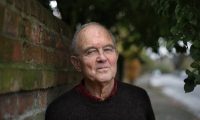
John Fuller’s house is deceptive. It sits at the end of a quiet street in north Oxford, whose broad, leafy vistas have long been the province of dons and daydreamers, although those denizens have now been joined by the super-wealthy, with their iceberg basements and climate-controlled wine cellars. Fuller, who celebrated his 80th birthday on New Year’s Day, settled here in the 1960s, and spent his academic career teaching English at Magdalen College where he eventually became vice-president. One of his duties was conducting an inventory of the college silver; the whole business was, he says amusedly, “almost like being a butler, or the social secretary”.
Cuba’s Jewish Unicorn
by Jake Marmer

For José Kozer, a Jewish-Cuban poet who settled in a small Florida town, exile is less a location than a method of unfolding, lyrically—unpacking one’s baggage of languages, influences, troubles, and odd biographical facts. In one of his poems, he writes, “I am the first and last Cuban generation.” Indeed, a son of Eastern European immigrants, grandson of the founder of the first Cuban Ashkenazi synagogue, he left Cuba at the age of 20 on ideological grounds.
For José Kozer, a Jewish-Cuban poet who settled in a small Florida town, exile is less a location than a method of lyrical unfolding.
Envoi: Editor’s Notes
I've been thinking about the new Neruda movie, which has yet to come to a theater near me, but which I want to see. I picked from my Neruda shelf, my worn copy of Residence on Earth. The pages in the book look like they were singed by fire, but really it's just the acid paper browning from the margins inward. The bookmark I got when I bought the book in the late 1970s is placed at one of my favorite poems by Neruda. In trying to determine what is so appealing about his poetry, even in translation, I realize it is not just his startling images, but more aptly his persistence of voice–not an authority of voice so much as a surety. At any rate, here's a Robert Bly translation of that poem. Enjoy.
Walking Around
It so happens I am sick of being a man.
And it happens that I walk into tailorshops and movie houses
dried up, waterproof, like a swan made of felt
steering my way in a water of wombs and ashes.
The smell of barbershops makes me break into hoarse sobs.
The only thing I want is to lie still like stones or wool.
The only thing I want is to see no more stores, no gardens,
no more goods, no spectacles, no elevators.
It so happens I am sick of my feet and my nails
and my hair and my shadow.
It so happens I am sick of being a man.
Still it would be marvelous
to terrify a law clerk with a cut lily,
or kill a nun with a blow on the ear.
It would be great
to go through the streets with a green knife
letting out yells until I died of the cold.
I don’t want to go on being a root in the dark,
insecure, stretched out, shivering with sleep,
going on down, into the moist guts of the earth,
taking in and thinking, eating every day.
I don’t want so much misery.
I don’t want to go on as a root and a tomb,
alone under the ground, a warehouse with corpses,
half frozen, dying of grief.
That’s why Monday, when it sees me coming
with my convict face, blazes up like gasoline,
and it howls on its way like a wounded wheel,
and leaves tracks full of warm blood leading toward the night.
And it pushes me into certain corners, into some moist houses,
into hospitals where the bones fly out the window,
into shoeshops that smell like vinegar,
and certain streets hideous as cracks in the skin.
There are sulphur-colored birds, and hideous intestines
hanging over the doors of houses that I hate,
and there are false teeth forgotten in a coffeepot,
there are mirrors
that ought to have wept from shame and terror,
there are umbrellas everywhere, and venoms, and umbilical cords.
I stroll along serenely, with my eyes, my shoes,
my rage, forgetting everything,
I walk by, going through office buildings and orthopedic shops,
and courtyards with washing hanging from the line:
underwear, towels and shirts from which slow
dirty tears are falling.
Pablo Neruda, 1904 – 1973
“It so happens I am sick of being a man.” – Pablo Neruda